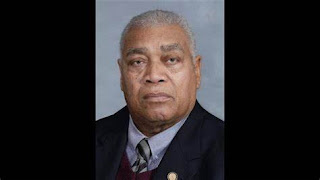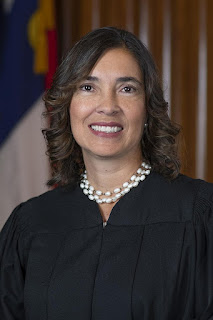STATE SENATOR MILTON "TOBY" FITCH, JR.
WHAT HAPPENED TO
THE BLACK VOTE
DURING THE MIDTERMS?
By Cash Michaels
Contributing writer
It’s a question that Democrats had better find the answer to prior to the 2024 presidential/NC gubernatorial elections.
What happened to the North Carolina Black vote during the November 2022 midterm elections?
By all accounts, turnout overall in North Carolina was lower in the 2022 midterms than in the 2018 midterm elections, despite predictions to the contrary initially. Fifty-three percent of the electorate voted in 2018, compared to just 51% in 2022, according to the North Carolina Board of Elections.
Part of the reason was a “depressed” voter turnout by the Democratic base, according to political analyst Thomas Mills.
“…African American voters had the lowest turnout since before Barack Obama won the state in 2008,” Mills stated in his Politics NC newsletter last week. “Overall, turnout was below 2018 by more than two percent despite a Senate race this year and a Blue Moon election four years ago.”
What is striking is that this low midterm election turnout contrast to the 75% of eligible voters casting ballots in the 2020 presidential election, which saw more than 5 million North Carolinians go to the polls.
The results of the 2022 midterms were made official on November 29th, so absolute final statewide numbers will take some time to be made available, but a few things are clear just based on the unofficial county-by-county tallies. Republicans were able to win a supermajority in the state Senate, fall one vote shy of a supermajority in the state House, take the majority on the state Supreme Court, maintain a majority on the state Court of Appeals, and essentially wipe out Black representation in Eastern North Carolina, because white, older Republican voters in the state’s rural voting districts “showed up, and showed out.”
But what was most surprising to many observers was that even rural counties that logged more African-American voters than white, went Republican, even though there was a moderate Black female Democrat running at the top of the ticket.
“While Cheri Beasley ran a competent [U.S Senate] campaign, raising the money to be competitive and keeping the race close until the fall, she failed to engage and motivate the base,” stated political analyst Thomas Mills. “She ran a cautious campaign in a year when she needed to take risks, either coming out more forcefully for some of her more controversial positions like legalizing marijuana or taking much harder jabs at Budd down the stretch.”
“Mills continued, “According to exit polls, her sensible policy positions won over independent voters by six points, but she still lost because Republican turnout substantially beat Democratic turnout.”
In short, Cheri Beasley failed to energize Black voters, especially young Black voters. True she did very well in urban counties. However, only Wake and Durham had above average turnout. Guilford and Forsyth had average, while Mecklenburg, Cumberland and Pitt were lackluster.
In rural Anson County for example, where President Barack Obama won in his 2012 reelection campaign, Democrat Beasley fell short.
And as noted before, Republicans were able to flip a number of Eastern North Carolina Black Democrat seats in Wilson, Nash, Pasquotank and Vance counties, sending veterans like state Sen. Milton “Toby” Fitch home.
Part of the reason was a redrawing of the voting district lines. But another reason is the fact that many of North Carolina’s historically African-American counties are losing Black population and getting older, while younger whites and Hispanics are moving in.
Looking at the county numbers, observers say the 2022 midterms skewed older and whiter than average.
So why was the 2020 election so large, and the 2022 election so small? Most observers say the Trump factor played a role. A majority of voters cast ballots because the former Republican president gave them a reason to - pro and con.
Many observers hoped that the U.S. Supreme Court’s controversial ruling against Roe v. Wade would be the same motivator. But while it may have been elsewhere in the country, it had little effect in North Carolina.
With polarizing Black Republican Lieutenant Governor Mark Robinson all but announced for governor in 2024, in addition to what is assured to be a hot national contest for president, perhaps involving Vice President Kamila Harris, North Carolina Democrats have to find more reasons to energize African-American and youth voters.
With Republicans in charge of almost the entire state governmental apparatus of North Carolina, observers say that will be a tough challenge indeed.
-30-
SHAW U FILES FEDERAL
COMPLAINT OVER
S.C. HIGHWAY STOP
By Cash Michaels
Contributing writer
Did the Spartanburg County, S.C. Sheriff’s Dept. violate the civil rights of a busload of Shaw University students during an Oct. 5th traffic stop search for drugs? University President Paulette Dillard says “yes,” while the authorities in South Carolina say absolutely not.
The question is in the hands of the U.S. Justice Dept. now as the historically-black institution announced just prior to the Thanksgiving holiday that it had filed a complaint with federal authorities to review the matter.
It was October 5th when a contract bus that the university hired to transport 18 Shaw students and two advisers, all Black, from Raleigh to an economic conference in Atlanta, Ga., was stopped and searched for illegal drugs by two Spartanburg Sheriff’s Dept. deputies with a canine.
Pres. Dillard, flanked by outside General Counsel Atty Dan Blue III and other Shaw Administration officials, told reporters during a November 21st press conference, that she doesn’t see the justification for a drug search to emanate from a simple traffic stop without probable cause.
S.C. authorities have claimed that the bus was stopped because the driver was weaving on the highway. They said deputies had concerns that the driver was falling asleep, and they couldn’t see inside the bus because it had tinted windows. So any accusation, authorities said, that the bus was stopped because it was carrying Black students is wrong.
But Pres. Dillard countered that every vehicle stopped for a traffic infraction on that S.C. highway isn’t searched for illegal drugs. So why was the Shaw bus searched, if racial profiling was not involved?
Spartanburg Sheriff Chuck Wright has said that of the 39 vehicles stopped by his deputies on that highway recently , at least one contained $500,000 in contraband, thus the value of the random selection otherwise known as “Operation Rolling Thunder.”
“If anything we’re ever doing is racist, I want to know it, I want to fix it and I want to never let it happen again,” Wright said during his own presser Nov. 1st. “But this case right here has absolutely nothing to do with racism.”
Wright, along with Cherokee County Sheriff Steve Mueller, and the two deputies involved in the search, screened body cam video of the Shaw bus incident, pointing out how courteous and cooperative the driver, Shaw advisers and students were when their bus was boarded.
The bodycam also showed the police dog sniffing through the luggage in the bus under carriage. Only one bag reportedly caused the dog to react, and it contained some prescription medicine, and a donut.
The deputies made no arrests, and the bus was allowed to proceed on to Atlanta. The same bus returned without incident days later.
In her Nov. 21 remarks, Pres. Dillard praised the traveling Shaw students for maintaining their composure during the incident.
Shaw Student Body President Mariah Williams also expressed pride in the manner which those students comported themselves, but then added that “now is the time for accountability.”
“The fight for civil rights is an ongoing necessity,” Ms. Williams added, lamenting how unfair it was for S.C. deputies to assume the worst of the traveling Shaw students just because they were Black.
Williams also reminded all that Shaw University is the birthplace of the Student Nonviolent Coordinating Committee, or SNCC, so seeking justice where there is none is an integral part of its history.
Atty Blue III told reporters that the university submitted a formal request for a federal investigation on November 14th to the U.S. Justice Dept. Blue maintains that the highway search was a violation of Title Six and other civil rights statues.
Blue said that based on the bodycam footage and narrative of the traffic stop, the complaint maintains that there is no evidence of a lane violation by the bus driver on the interstate highway. Secondly, the students never provided consent for their bags in the bus under carriage to be physically searched, which the video shows also happened with at least three student bags. In fact, students did not know their bags were also being physically searched until they saw the law enforcement video weeks later.
“And third, probably most importantly as Dr Dillard alluded to, this traffic stop, as we learned, was part of Operation Rolling Thunder, which is an operation that South Carolina conducts periodically each year and has done so for the last many years where they police the interstates, particularly using lane violations and traffic stops to seize illegal weapons and drugs, Atty Blue continued.
“More importantly, they seized currency last year. During this operation, they seized over $968,000. This operation is something that they continue to do and it's something that's alarming. It gives them every motivation to turn every traffic stop, every lane violation, every faulty turn signal, every busted tail light into an illegal search and seizure for which they're compensated and rewarded while people are traumatized and stopped during their travels. “
Blue said Shaw officials have submitted a complaint to the U.S. Justice Dept. for review, which should then forward it to the appropriate team or agency within for resolution. He added that whatever the Justice Dept.’s final decision, Shaw University has done its part by standing up for justice.
-30-






